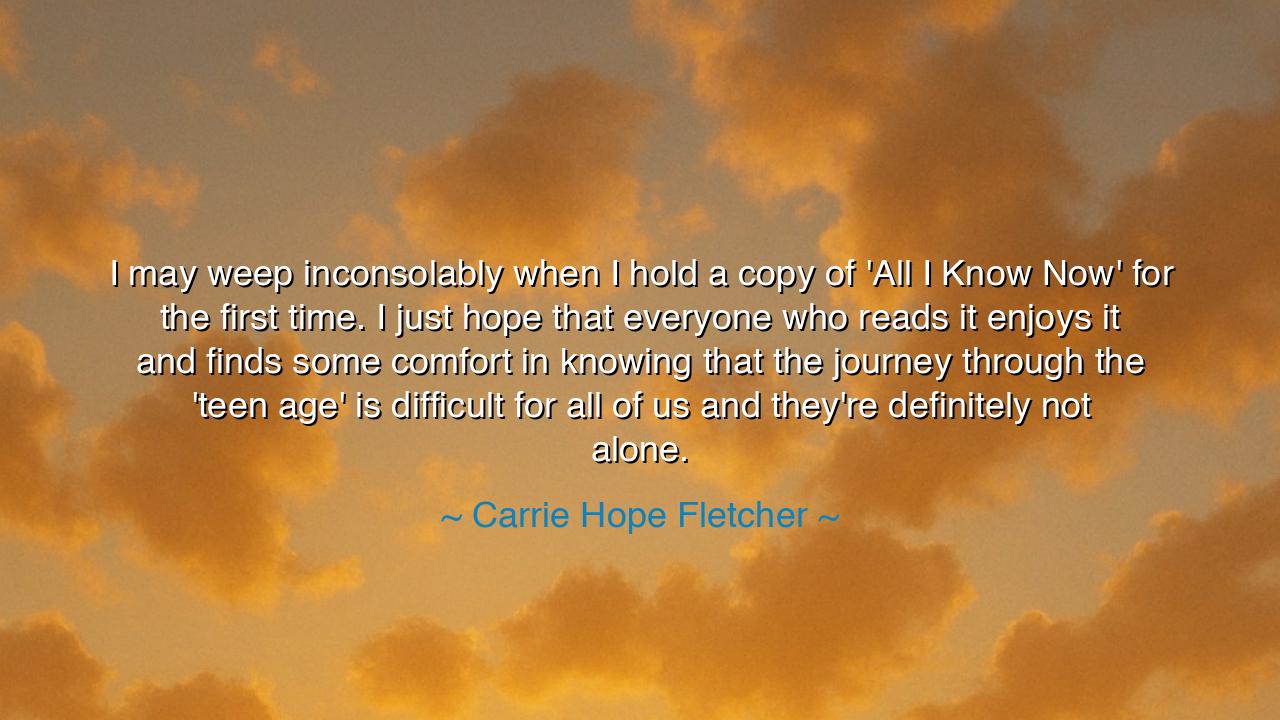
I may weep inconsolably when I hold a copy of 'All I Know Now'
I may weep inconsolably when I hold a copy of 'All I Know Now' for the first time. I just hope that everyone who reads it enjoys it and finds some comfort in knowing that the journey through the 'teen age' is difficult for all of us and they're definitely not alone.






Hear the tender words of Carrie Hope Fletcher, who spoke with the vulnerability of both author and guide: “I may weep inconsolably when I hold a copy of ‘All I Know Now’ for the first time. I just hope that everyone who reads it enjoys it and finds some comfort in knowing that the journey through the ‘teen age’ is difficult for all of us and they’re definitely not alone.” These words, born from her own trials and triumphs, are not only about the birth of a book, but about the power of shared experience, and the healing found in knowing that one’s struggles are universal.
To weep inconsolably at the sight of her own work is the cry of an artist who has poured her heart onto the page. For a book is not mere ink and paper—it is memory made tangible, a soul given form. Fletcher’s tears are not of sorrow, but of reverence, for she knows what such a work represents: years of doubt, growth, scars, and hope distilled into words that may guide others through the storms of youth. In this weeping lies the ancient truth that art is both catharsis for the creator and light for the reader.
Her hope is simple yet profound: that the readers of ‘All I Know Now’ may find comfort. Comfort in what? In the knowledge that the trials of the ‘teen age’—those years of confusion, longing, identity, and fear—are not borne by them alone, but are part of the universal passage of humanity. This is the wisdom of fellowship: the recognition that while each journey is unique, the struggles of growing up are shared across generations. To say “you are not alone” is to lift a burden heavier than any one heart should carry.
History echoes with such acts of comfort. The philosopher Seneca, in writing his letters to Lucilius, sought not only to teach but to console, assuring his friend that the storms of life had been endured by others before him. Anne Frank, though hidden in the shadow of persecution, wrote her diary with a longing that others might understand her struggles. And countless poets, from Rumi to Whitman, have reminded their readers that the pains of becoming are not solitary. Fletcher joins this lineage of voices who transform personal trial into communal solace.
In her words also lies a deeper heroism: the courage to admit that the ‘teen age’ is difficult. Too often the young are told to endure in silence, as though their struggles are trivial compared to the burdens of adulthood. But Fletcher elevates their pain, declaring it worthy of compassion and recognition. By doing so, she not only comforts but dignifies the journey, affirming that these struggles shape the soul no less than the hardships of later life.
The meaning of her words, then, is this: creation is an act of service. Fletcher’s book is not written for glory or applause, but for the healing of others. Her tears are not only for herself, but for the hope that someone, somewhere, might read her words and feel less lost. In this act we see the nobility of the artist: to transform personal hardship into a torch that lights the path for those still stumbling in the dark.
Therefore, my child, take this lesson: whatever pain you endure, do not believe it wasted. If you have suffered, know that your story can one day be the comfort of another. Speak, write, sing, create—whatever form your truth takes, share it with honesty. In doing so, you may not only heal yourself but also remind another soul that they are not alone in their trial.
So let Carrie Hope Fletcher’s words endure: “The journey through the ‘teen age’ is difficult for all of us, and they’re definitely not alone.” May you remember that though the road is often dark, it is a road walked by many, and that the very act of sharing your burden may turn it into light for someone else. In this, you will find the highest calling of art and of life: to turn your wounds into wisdom, and your story into strength for generations to come.






AAdministratorAdministrator
Welcome, honored guests. Please leave a comment, we will respond soon